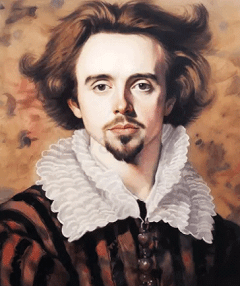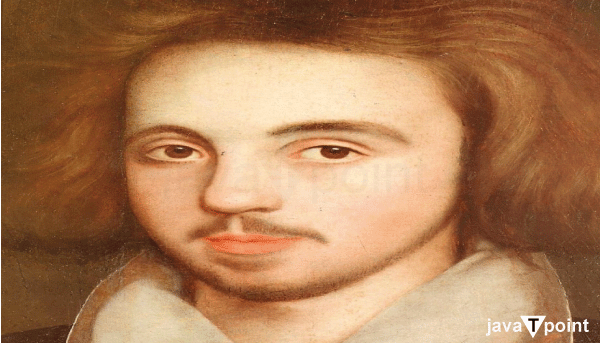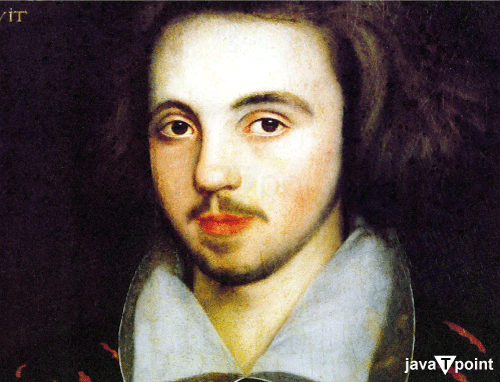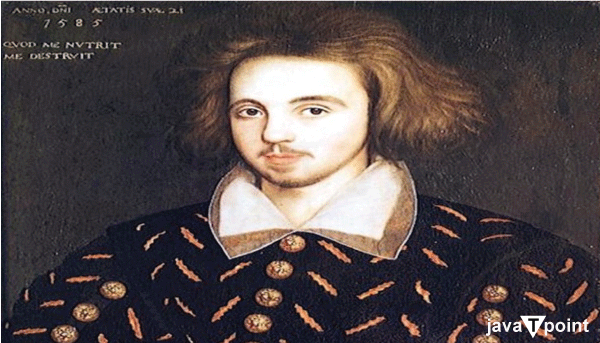Christopher Marlowe
An important character of the Elizabethan period known as Christopher Marlowe is regarded as an iconic playwriter and poet whose works revolutionized English poetry and theatre. Marlowe was a brilliant English playwright who passed away too soon. He was born in Canterbury, England, in 1564. Scholars and historians have been captivated by his astounding literary accomplishments as well as his intriguing and turbulent life for ages. We shall go through Christopher Marlowe's life and times in this thorough biography, looking at his early years, his schooling at Cambridge University, and the beginnings of his literary career. We'll look into some of his ground-breaking works, including "Tamburlaine the Great," "Doctor Faustus," and "The Jew of Malta," which launched him to renown and made him a forerunner of the English Renaissance. Marlowe's life, meanwhile, wasn't without controversy. The narrative of this great writer is complicated by rumours of espionage, charges of atheism and heresy, and a crucial encounter that ultimately ended in his death. We shall clarify the enigmas surrounding his unexpected death and the persistent rumours that surround its circumstances. Despite having a brief life, Marlowe left a lasting impression on literature. We'll talk about how he influenced other playwrights and authors, including people like William Shakespeare. His influence lives on through contemporary reimaginings and adaptations, sustaining the ongoing impact of his works. The tragedy, passion, and genius of Christopher Marlowe's drama perfectly capture the spirit of the Elizabethan period. His deep creative contributions have inspired, informed, and entertained readers and fans throughout the world for countless years, cementing his legacy in literature for future generations. Join us as we set out on our trip to learn more about the mysterious dramatist who influenced English writing. Childhood and Education
1. Unremarkable Family and Birth HistoryOn February 26, 1564, Christopher Marlowe was born in Canterbury, Kent, England. Although there are no records for his precise birth date, the fact that he was baptized on February 26 suggests that he was probably born a few days earlier. He was the oldest child of Catherine Arthur and John Marlowe, who both came from modest beginnings. The family of John Marlowe, a shoemaker by trade, belonged to the lower middle class. The Marlowe family, despite their limited means, placed a high priority on education, which would ultimately have a significant impact on Christopher's intellectual interests. 2. Growing Up in CanterburyChristopher Marlowe had a regular 18th-century upbringing growing up in Canterbury. His early thoughts on literature and life were influenced by the city's busy environment, history, and religious importance. Marlowe was educated at the prestigious King's School in Canterbury, which is famous for its classical curriculum. Here, he was exposed to the writings of classical Greek and Roman authors like Ovid, Seneca, and Virgil, which had a big effect on his subjects and creative style. 3. University of Cambridge and ScholarshipsMarlowe's intellectual prowess was recognized, and in 1580 he was given a scholarship at Corpus Christi College in Cambridge as a result of his excellent abilities. The generosity of the Archbishop of Canterbury, Matthew Parker, who saw Marlowe's promise and encouraged his pursuit of higher education, resulted in the awarding of this fellowship. Marlowe pursued the typical curricula of the period at Cambridge University, which included the trivium (grammar, rhetoric, and logic) and the quadrivium (arithmetic, geometry, music, and astronomy). His intellectual growth was further affected by his exploration of ancient literature, philosophy, and theology. Marlowe's creative skill blossomed when he was a student at Cambridge, and he started to write plays and poems that showcased his outstanding grasp of the dramatic arts and language. He had no idea that his experience in college would establish the groundwork for his future success and have a lasting impression on the field of English literature. Literary Genesis
Early Works and Influence of MarloweAt Cambridge University, Christopher Marlowe started to build his literary career. Marlowe began to play with poetry and theatrical writing after being influenced by the classical works he read and the thriving Elizabethan literary culture. Marlowe wrote a number of poems and translated Latin texts into English when he was an undergraduate. His early works demonstrated his poetry mastery and offered a sneak preview of the literary ability that would later flourish in his mature works. Marlowe's interest in classical literature and his reverence for ancient heroes would have a big impact on the way he wrote. To set himself apart from his peers, he embraced the use of grandiose vocabulary, heroic subjects, and theatrical flair in his works. 2. "Tamburlaine the Great": An InnovationThe two-part historical drama "Tamburlaine the Great," based on the biography of the Central Asian conquistador Timur (Tamerlane), was Marlowe's first notable success and represented a substantial break from the then-current theatrical standards. Marlowe's inventive use of blank verse?an unrhymed variation of the iambic pentameter he had previously studied?in "Tamburlaine the Great" was on display. This was a pivotal moment in the development of English theatre because Marlowe's daring use of blank verse freed aspiring playwrights from the confines of rhyme and gave them more freedom and expression. Tamburlaine, the play's main character, is a charming and driven warrior who emerges from modest beginnings to conquer and rule over large lands. The writer Marlowe rose to popularity and cemented his status as a trailblazing playwright thanks to the themes of ambition, power, and the unrelenting pursuit of greatness that connected with audiences at the time. 3. The Quest for Knowledge and Damnation in "The Tragical History of Doctor Faustus"The world premiere of Marlowe's masterpiece, "The Tragical History of Doctor Faustus," took place in London in 1588. The German tale of Faust, a scholar who bargains his soul with the devil in return for limitless knowledge and earthly pleasures, serves as the basis for this drama. Marlowe expertly combines aspects of tragedy, morality, and paranormal elements in "Doctor Faustus," engaging the audience with a profound investigation of the human condition. Thought-provoking issues on the pursuit of power and the effects of unrestrained ambition were brought up by Faustus' search for knowledge and his tragic agreement with Lucifer. The play's famous soliloquies, especially Faustus' harrowing cry for mercy, show off Marlowe's talent for delving deeply into his characters' psyches and stirring up strong feelings in his audience. Marlowe's "Doctor Faustus" cemented his position as one of the most influential writers of the English Renaissance and secured his reputation as a master of tragic drama. 4. Controversial Themes and Characterization in "The Jew of Malta""The Jew of Malta" is another one of Marlowe's well-known plays, having been published in 1590. The themes of avarice, retaliation, and religious strife are explored in depth in this gloomy and thought-provoking masterpiece. The main character of the play, Barabas, is a Jewish merchant who seeks retribution against his adversaries after losing his rank and possessions. Marlowe's sly and brutal characterization of the character Barabas mirrors the time's pervasive anti-Semitism. The film "The Jew of Malta" was criticized for its stereotypical portrayal of Jews and for inciting anti-Semitic sentiment. Despite the controversy, Marlowe's reputation as a risk-taking and avant-garde playwright was enhanced by the play's intricate narrative and captivating characters. Early works by Marlowe laid the foundation for the enormous influence he would later have on the field of English literature. He stands out as a literary force to be reckoned with because of his use of blank poetry, examination of ambitious characters motivated by power and knowledge, and willingness to take on contentious issues. Marlowe's dramatic brilliance would soar to even higher heights as his career flourished, leaving an enduring mark on the history of English play. Espionage Claims and Controversies1. Espionage Commitment by MarloweOne of the most fascinating elements of Christopher Marlowe's history is his supposed involvement in espionage. His life was not without controversy. Political intrigue was rampant in Elizabethan England, and the government depended on a network of spies to obtain information and defend the Crown's interests. Due to his contacts at Cambridge University or his language abilities, which would have been useful for decoding coded messages and corresponding with foreign operatives, Marlowe may have been recruited into this spy network, according to the evidence. Marlowe's name first came to light in 1592 in relation to the "Babington Plot," a scheme to kill Queen Elizabeth I and install Mary, Queen of Scots as the English monarch. Thomas Kyd, a friend and fellow writer of Marlowe, was detained on suspicion of taking part in the scheme, and officials discovered a seditious letter that Marlowe was reportedly named. This letter, dubbed the "Baines Note," allegedly accused Marlowe of atheism and harboring traitorous thoughts. The Baines Note's veracity has been contested, but it is thought to have added to the rising unease over Marlowe's activities. 2. Legal Issues and IncarcerationMarlowe dealt with legal issues of a different kind in the midst of the espionage accusations. He was accused of being involved in a street fight that killed William Bradley in 1593, putting him in legal danger. Although the specifics of the incident are still unknown, Marlowe was detained and charged with murder. However, it appears that Marlowe's contacts and potential espionage activity helped to lessen the accusations brought against him. A royal pardon was granted soon after Marlowe's arrest, and he was thereafter freed. But the shadow of suspicion lingered over him nonetheless. He had to often report to the Privy Council, and the authorities closely watched his every move. Marlowe was able to continue composing and presenting plays despite his legal and espionage troubles during this trying time. In the midst of controversy, his literary accomplishments did not diminish, and his creative production remained prodigious. Scholarly discussion and conjecture continue to surround the claims of espionage and the circumstances surrounding the Baines Note. While some argue that Marlowe actually engaged in espionage, others contend that he may have been the victim of political intrigue or even that the allegations of espionage were made up or exaggerated in order to harm Marlowe's reputation. The conflicts and espionage accusations, in any event, give a fascinating element to the life of Christopher Marlowe and transform the biography into a tale full of mystery and intrigue. Even more mysterious qualities of this extraordinary dramatist and poet will come to light as we continue to examine his life and works. Christopher Marlowe's Mysterious Death
1. The Serious Clash at the "Mermaid Tavern"Christopher Marlowe's life changed dramatically in the year 1593 since it was then that he had a disastrous meeting that would ultimately result in his untimely death. Marlowe got into a contentious debate with some guys on May 30, 1593, at the "Mermaid Tavern," a pub in Deptford, London. The exact cause of the altercation is unknown, but it is widely believed that the argument may have been started by political or espionage-related issues. One of the men present was Ingram Frizer, an agent in the service of Sir Thomas Walsingham, a cousin of the late Sir Francis Walsingham, the former principal secretary and spymaster for Queen Elizabeth I. Frizer pulled out a knife during the argument and brutally stabbed Marlowe in the forehead, killing him at the age of 29. Over the ages, there have been a lot of rumours and conspiracy theories based on the circumstances of the confrontation and the identities of the other individuals involved. 2. The "Official" Version and the Coroner's InquestA coroner's inquest was convened after Marlowe passed away to look into the specifics of the violent confrontation. The official judgment determined that Marlowe's killing was an act of self-defense based on the testimony of witnesses, including Frizer himself. The official account of what happened states that Marlowe used his own dagger to attack Frizer. During the ensuing fight, Frizer was able to take the weapon from Marlowe's grasp and wield it in self-defense, dealing the fatal blow to Marlowe's forehead. The inquest's conclusion looked to clear Frizer of any criminal wrongdoing and indicated that the occurrence was more likely a sad accident than a deliberate act. Frizer was thus freed and not accused of murder. 3. Alternative Theories and Conspiracy TheoriesOver time, a number of conspiracy theories and other scenarios have surfaced, casting doubt on the official account of what happened and raising the possibility that Marlowe's death wasn't just an accident. One well-known hypothesis claims that Marlowe's demise was faked and that he was permitted to flee the country to avoid being arrested for his espionage endeavors. According to this argument, Marlowe may have carried on working for the government covertly while adopting an alias or maintaining confidentiality. Other hypotheses contend that Marlowe's demise was a component of a larger plot involving influential people who had political objectives. Some claim that his involvement in espionage and contacts with powerful people made him a target for death. These alternate theories are fascinating, but they are still only speculation since they lack supporting data. The precise details of that terrible day at the "Mermaid Tavern" continue to evade historians and academics, as do the genuine circumstances surrounding Christopher Marlowe's death. The intrigue and mystique of Marlowe's life and legacy have only been heightened by the mystery surrounding his passing. Despite the doubts, his creative brilliance and contributions to English literature have cemented his status as one of the greatest playwrights of the Elizabethan age, making a lasting impression on the worlds of theatre and poetry. The Influence and Legacy of Marlowe1. Publications and Memorials Following DeathThe posthumous release of some of Christopher Marlowe's incomplete works allowed his literary legacy to flourish after his untimely passing. Two of his plays, "Edward II" and "The Massacre at Paris," were published in 1594, a year after his death. "Edward II" enhanced Marlowe's standing as a master of historical drama and demonstrated his talent for making sad characters relatable. More of Marlowe's plays and poetry were published in the years that followed, including his unfinished drama "Hero and Leander," which was finished by George Chapman, and "Dido, Queen of Carthage," which he co-wrote with Thomas Nashe. These posthumous releases made sure that Marlowe's literary accomplishments were read by a larger audience and kept receiving praise. His contemporaries also built memorials for Marlowe. Other poets and authors published elegies and tributes to celebrate Marlowe's ability and grieve his unfortunate death. In his play "Apology for Actors" in 1599, the playwright Thomas Heywood lauded Marlowe, referring to him as "Marley, the Muses' darling." 2. Influence on Playwrights and Writers of the FutureThe literary world was significantly impacted by Christopher Marlowe long after his own lifetime. His inventive use of blank verse, complex characters, and investigation of serious subjects had a significant influence on succeeding playwrights and authors. He played a crucial part in the development of English theatre and poetry. The early works of William Shakespeare most prominently show Marlowe's influence. The amount of Marlowe's effect on Shakespeare has long been a topic of discussion among academics. Some have hypothesized that plays by Shakespeare on early history, including "Henry VI" and "Richard III," may have drawn inspiration from Marlowe. Later generations of authors wanted to imitate Marlowe's style and dramatic mastery because of his command of language, persuasive rhetoric, and investigation of moral and philosophical issues. Shakespeare's works were very successful, but Marlowe's legacy lived on, and his plays were still performed and enjoyed by audiences. 3. Interpretations of Marlowe's Works in Modern TimesThe writings of Christopher Marlowe have undergone countless adaptations, reinterpretations, and revivals in more recent decades. In order to reinterpret his plays and examine their issues through contemporary glasses, directors, playwrights, and screenwriters have tried to do so. Marlowe's plays, including "Doctor Faustus" and "Tamburlaine," have seen several theatrical performances and cinematic adaptations, giving them fresh life and introducing them to a modern audience. These adaptations are evidence of the ideas and characters from Marlowe's works being captivating and having an impact on contemporary sensibilities. Outside of theatre and film, Marlowe's impact may be seen in the writings of poets, authors, and academics who are inspired by his innovative use of language and his investigation of human nature. ConclusionThe prolific Elizabethan dramatist and poet Christopher Marlowe had a lasting impression on English literature. Marlowe's creative genius showed throughout his career, from his early years at Cambridge University through his ground-breaking plays and poetry. He stands out as a literary powerhouse due to his inventive use of blank poetry, the development of ambitious and tragic characters, and his willingness to take on contentious subjects. The frontiers of English theatre were redefined by Marlowe's plays, such as "Tamburlaine the Great," "Doctor Faustus," and "The Jew of Malta," opening the door for other authors and influencing the development of theatre history. Both laypeople and academics are enthralled by his command of words and examination of the human mind. Marlowe's life did not, however, come without some controversy. His story has been made more intriguing by allegations of espionage, atheism, and his strange passing at the "Mermaid Tavern." His death's circumstances are still a mystery, which has led to many ideas and conjectures. Despite the issues, Christopher Marlowe's legacy lives on. His impact on succeeding playwrights, most notably William Shakespeare, may be seen in the longevity of his works' appeal and the literary landscape they have altered. His plays and poetry's contemporary adaptations confirm their timeless themes and eternal significance. The tragedy, passion, and brilliance of Marlowe's story perfectly capture the spirit of the Elizabethan period. Readers and fans all throughout the world continue to be motivated, informed, and entertained by his tremendous contributions to literature. The depths of human passion and the complexity of the human condition are explored in his writings, making Christopher Marlowe an enduring light in the fabric of English Renaissance literature. As we say goodbye to this mysterious playwright and poet, we are reminded by the words and characters he left behind that, despite leaving this earthly stage too soon, his legacy will live on in the hearts and minds of those who recognize the lasting value of his creative works. The playwriter and poet Christopher Marlowe, who created Elizabethan theatre, will always be remembered in literary history as a testament to the creative brilliance and limitless potential of the human spirit. Childhood and Education
Next TopicDalip Kaur Tiwana
|
 For Videos Join Our Youtube Channel: Join Now
For Videos Join Our Youtube Channel: Join Now
Feedback
- Send your Feedback to [email protected]
Help Others, Please Share









